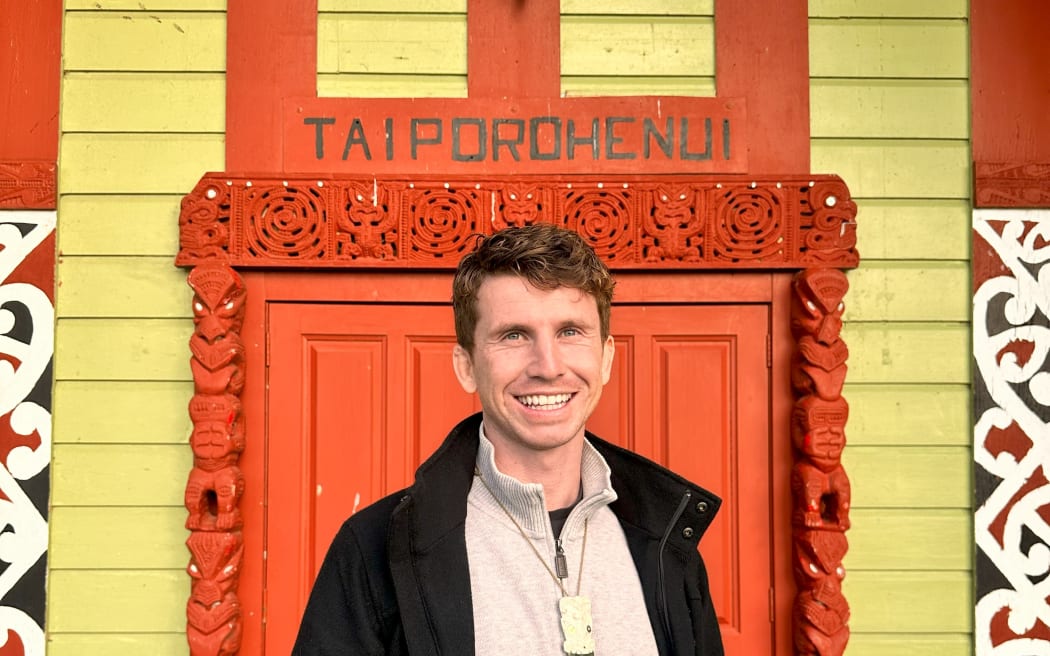Entertainment
Airana Ngarewa Launches Provocative Novel ‘The Last Living Cannibal’

Author Airana Ngarewa has released his third book, titled ‘The Last Living Cannibal’, which reimagines life in Taranaki during the 1940s. Ngarewa, who has previously focused on contemporary themes, aims to explore historical narratives that reflect his family’s experiences. He will be promoting the book at various bookstores and writers’ festivals across the country in the coming weeks.
The novel draws inspiration from the historical figure Tītokowaru, a leader of the Ngāruahine iwi, who waged a guerrilla campaign against the colonial government in 1868. Ngarewa explains that Tītokowaru’s strategy included provoking colonial forces into conflict on familiar ground, which he achieved through dramatic acts, including the killing and ritual consumption of a colonial soldier. This provocative history serves as a backdrop for Ngarewa’s narrative, though he sets the story in a later time period, reflecting the broader context of Māori resistance during the Second World War.
In the 1940s, many Māori in Taranaki and Waikato chose not to enlist in the Māori Battalion. Ngarewa’s writing is rooted in discussions held at the pariroa marae, located just outside of Pātea, where families gathered to share stories and reconnect with their cultural heritage. His own connection to these narratives is deep, as he identifies with the Ngāti Ruanui, Ngāruahine, and Ngā Rauru iwi, tracing his lineage back to the arrival of Turi, the captain of the Aotea waka.
Ngarewa recounts a significant family history, noting that during the colonial conflicts, his ancestors were arrested and sent to Dunedin. They returned to Taranaki in 1872, a time when churches were built on battle sites as part of a movement towards reconciliation with the colonial government. These historical moments, he says, were largely forgotten until recent generations began to revive them.
While the subject matter of the novel is serious, Ngarewa emphasizes that Māori storytelling often incorporates elements of humor and lightness. He highlights the cultural practice of engaging with both serious themes and laughter during events like pōwhiri. This blend of tones is reflected in his writing, even in the naming of characters, such as a boy named Dairy, whose heritage is a mix of Māori and Irish.
As Ngarewa embarks on this literary journey, he hopes to illuminate the complexities of Māori identity and history, enriching the understanding of a past that has shaped contemporary New Zealand. His work stands as a testament to the resilience and creativity of his people, inviting readers to explore both the shadows and the light in their shared narratives.
-

 World3 months ago
World3 months agoTest Your Knowledge: Take the Herald’s Afternoon Quiz Today
-

 Sports3 months ago
Sports3 months agoPM Faces Backlash from Fans During Netball Trophy Ceremony
-

 Lifestyle3 months ago
Lifestyle3 months agoDunedin Designers Win Top Award at Hokonui Fashion Event
-

 Sports3 months ago
Sports3 months agoLiam Lawson Launches New Era for Racing Bulls with Strong Start
-

 Lifestyle3 months ago
Lifestyle3 months agoDisney Fan Reveals Dress Code Tips for Park Visitors
-

 World3 months ago
World3 months agoCoalition Forms to Preserve Māori Wards in Hawke’s Bay
-

 Health3 months ago
Health3 months agoWalking Faster Offers Major Health Benefits for Older Adults
-

 Politics3 months ago
Politics3 months agoScots Rally with Humor and Music to Protest Trump’s Visit
-

 Top Stories3 months ago
Top Stories3 months agoUK and India Finalize Trade Deal to Boost Economic Ties
-

 World3 months ago
World3 months agoHuntly Begins Water Pipe Flushing to Resolve Brown Water Issue
-

 Entertainment3 months ago
Entertainment3 months agoExperience the Excitement of ‘Chief of War’ in Oʻahu
-

 Science3 months ago
Science3 months agoNew Interactive Map Reveals Wairarapa Valley’s Geological Secrets









